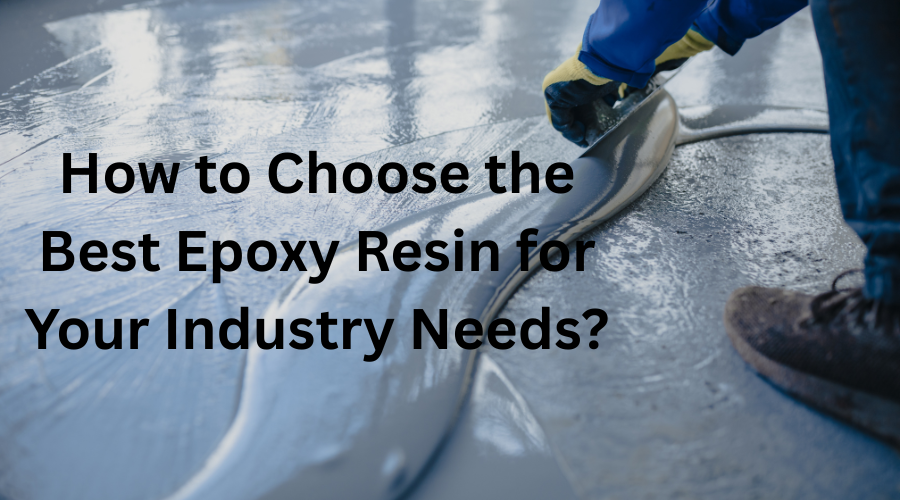
One can’t go with the same epoxy resin for all the applications. Different types of materials have different compatibility with adhesives and coatings. When we talk about selecting epoxy resin, several factors must be considered for the right decision. Industries like adhesives, coatings, metal products, composites, and chemicals have one thing in common: epoxy resin. How they select the right type will be discussed below.
There are around five types of epoxy resins commonly used in industrial applications. You can find out their applications, which will help you decide what’s best for your requirements.
BPA or bisphenol epoxy type A is one of the types that is common in many industries. Its mechanical strength, high hardness, and chemical resistance make it suitable for heavy-duty applications. Using this type of epoxy provides hardness and strength together for long-term protection of whatever is coated with it.
Another type is bisphenol epoxy type F. Its viscosity is lower than that of type A, which makes it more flexible for various applications. Also, it shows higher thermal resistance for extreme conditions.
These two types of bisphenol epoxy resins have slight differences in performance, but they are both suitable for various industries. However, there is a drawback, which is BPA leaching. Since it is used in metal cans as a protective coating, it could leach into food. Also, it is a contaminant that can cause environmental damage.
BPA epoxy resin is suitable for coatings and adhesives, especially for electrical insulation. Since it works as a barrier between electric components, the electrical insulation in various appliances is efficient through it.
Plastic and composite manufacturers use it in the production of composite materials like polycarbonate plastic for strength. Its mechanical strength makes it a suitable choice to resist shocks and damage at a mild level.
Since it adheres to a metal surface, its typical application is the internal coating of food cans. It prevents food from having contact with a metal surface.
Bisphenol epoxy resin also works as a floor coating due to its high mechanical strength. It also provides decorative layers in wooden goods like tables.
However, it is not suitable for outdoor applications since it has poor resistance to UV rays.
Then you have the second type, which is glycidylamine epoxy resin. It is popular in industrial applications because of its high bonding strength, waterproofing, and chemical resistance. These three characteristics make it common for harsh conditions. Then comes its electrical insulation, heat resistance, and low viscosity. These three factors further make it worthwhile for lots of industries that want superior strength in adhesives, coatings, and fillings.
Its ability to provide waterproofing and high bond strength makes it advantageous to the industries that require hyper-protecting of sensitive components. When electrical, chemical, or electronic applications are being used, the glycidylamine epoxy resin offers ensuring protection by regulating moisture and chemicals from causing damage to the desired component.
Machines, auto parts, and aircraft industries need glycidylamine epoxy resin for protective layers against corrosion. It works as a super protective barrier between the moisture and metallic surfaces.
The marine industry needs adhesives and coatings to protect sensitive parts from continuous moisture. They use this glycidylamine type to prevent water and chemical corrosion.
Another advantage it provides is the protection of goods from high temperatures. High-temperature adhesives are produced by adding a glycidylamine type for superior performance in extreme conditions.
Petroleum and chemical industries need coatings on various surfaces, like floors and equipment, for corrosion protection. They use coats that contain these epoxy resins for advanced protection from chemical damage.
Electronic and electrical appliances need coatings on sensitive components, and nothing is better than epoxy resin. Therefore, this waterproof, heatproof, and insulating resin is used for enhanced protection.

Then you have novolac epoxy resin, which offers thermal resistance, strong adhesion, and chemical resistance together. It means this type can provide superior resistance where industries need something rugged and robust. Places where the risk of heat contact is high require something powerful. Novolac type can also offer electrical insulation, implying that it is a versatile epoxy resin in several industries.
It is common in the production of adhesives, paints, and coatings for robust strength.
Not only that, but it is also used in carbon fiber and fiberglass production. That makes it compatible for composite products to add strength against various challenges.
Electrical and electronic goods need electrical insulation in some components. They use novolac epoxy resin to achieve those targets. Hence, the sensitive components remain safe from various threats like chemicals, heat, and dust.
Many products and workplaces need safety from chemical threats. This epoxy resin type provides excellent protection from chemical spills and splashes. Floors, equipment, and components are coated with this epoxy for enhanced safety.
This is why chemical production plants and testing labs need chemical-resistant floors coated with novolac epoxy resin.
It is also common for tank linings to prevent corrosion and leaching inside the tanks.
Here is an aliphatic epoxy resin that can deal with weather challenges. It makes it suitable for outdoor applications where the biggest threat, like UV rays, can damage most types of epoxy resins. This is why it is used in various applications that deal with the constant danger of ultraviolet rays.
Also, its low dielectric constant, low viscosity, and low toxicity make it suitable for lots of applications. It shows high flexibility to be compatible with lots of applications.
Since it deals with weather challenges like UV rays the best, it is common in coatings, paints, and adhesives industries. These industries use this epoxy resin to enhance the UV resistance in their products. Whenever it comes to outdoor applications, the aliphatic type shows excellent performance.
Even the electronics industry gets lots of support from it. The reason is the dielectric characteristic that assists in electronic boards. Coatings for sensitive components from this type prove to be beneficial.
Then the last type is halogenated epoxy resin. It is not very common and is used only in rare cases. The reason is the risk involved, which is related to the release of harmful chemicals from it. However, it is an excellent flame retardant for thermal applications. Industries that need thermal resistance with electrical insulation choose it.
Due to its toxin release, industries prefer to use halogen-free epoxy resins. It is not suitable where a transparent finish is required. Another factor in its rare use in the industry is its high cost.
Electrical appliances that might face the risk of overheating, sparking, and explosion need halogenated epoxy resins. Industries use it to make the appliances flame-retardant.
Electronic industries use them in PCBs to get dielectric performance and flame resistance.
Some industries use it as coatings and adhesives to prevent the risk of flames in extreme conditions. Special coatings against the risk of fire are used, and they contain halogenated epoxy resins.
The method is simple, and you need to know the strengths and weaknesses of each epoxy resin type. Read all the above types and their applications to select the right type for your industrial applications. Different products have to deal with challenges like chemicals, pressure, heat, UV rays, and moisture to survive. Using the correct type of epoxy resin will give you the best results. How you can choose the right one is by knowing the resistance level of each type.
Industrial applications have to face lots of environmental and internal challenges that can pose serious threats. Whether it is about their working conditions or products, everything faces some kind of threat. From moisture to heat, each factor causes risk of damage. The only way to prevent that damage is to use epoxy resin as a coat, filler, or adhesive. Even many composite products, such as polycarbonate and carbon fiber goods, contain epoxy resins for enhanced strength. If you need to choose the right one, you need to know the strengths of each type that match your needs.